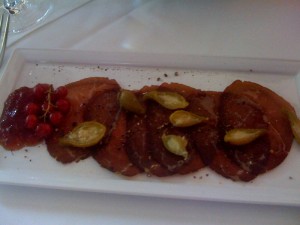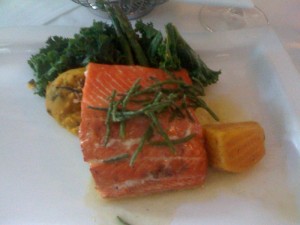The Fish House in Stanley Park has launched a special menu this summer, the Klahowya Menu. Much like the ubiquitous ‘ciao’ of Italian, ‘klahowya’ means ‘welcome,’ ‘how are you?’ or ‘good-bye’ in the Chinook Jargon* of the Pacific Northwest. This summer, The Fish House in Stanley Park will welcome its guests with a special three-course aboriginal-inspired Klahowya Menu in honour of the new Klahowya First Nations Village in Stanley Park. Priced at $48 for three-courses, the special menu pays homage to the ingredients and cooking techniques used by the native peoples of this region and will be offered from July 9th through September 6th. For those with smaller appetites, each of the courses is also available individually.
The dinner starts off with a flavourful Cold Smoked Bison Carpaccio served with mountain cranberry compote and picked milkweed pods. Smoking is an ancient technique used by First Nations people to preserve both meats (such as bison and venison) and fish caught in the summer months for consumption later during the winter season. Cold smoking concentrates the rich flavour of the bison that is complimented by the tartness of the cranberry compote. The milkweed pods are picked when young and slender and pickled in cider brine creating a condiment similar to gherkins.
Cedar-Planked Wild Sockeye Salmon is the main course. Cedar-planking is a traditional First Nations’ cooking technique. Nowadays almost anyone who barbeques in this corner of the world knows about cedar-planking, but outside of this region, the technique and the flavour it imparts is considered quite exotic. Of course, summer is sockeye season and visitors and locals alike can hardly wait to feast on this meaty indigenous fish. In Chef Barnaby’s presentation, the filet is dressed with a classic beurre blanc sauce which has been ‘localized’ with a slight hint of cedar to set-off the cedar-smokiness of the salmon.
Summer is elderberry season. Native throughout temperate climates in both the northern and southern hemispheres, elderberries have always been used to sweeten foods or to create cordials, compotes and wine. British Columbia Is home to several native species of elderberry including Pacific Coast Red Elderberry, Black Elderberry and Blue Elderberry. In this instance Chef Barnaby swirls elderberry compote through her rich and creamy Elderberry Swirl Cheesecake with Hazelnut Crust. Hazelnuts also grow wild (including in some Vancouver back lanes) throughout the region.
I loved each of these 3 courses, each dish was quite different though was well prepared and went well with the Nk’Mip Wine pairings. I especially liked the Sea Asparagus on top of the salmon along withe the Kobacha Squash side.
“Many people are curious about eating locally and seasonally, and about how they can reduce their carbon footprint. First Nations people ate abundantly from what nature had to offer with great respect for their environment,” says Executive Chef Karen Barnaby. “For our Klahowya menu, I’m using ingredients that I normally use at this time of year; I’m just presenting them in a different way and incorporating more wild foods into the dishes.”
In the tradition of table d’hôte, the Fish House has partnered with Okanagan winery Nk’Mip Cellars to offer three wines to complement the flavours of the menu. “We are so proud to be partnering with Nk’Mip as it is North America’s first aboriginal owned and operated winery. In a very short time they have garnered a huge reputation for producing wines of exceptional quality and complexity,” says Fish House Marketing Manager and wine aficionado Carole Dulude (herself a member of the Mohawk First Nation from Oka, Quebec).
Diners will have a choice of enjoying Nk’Mip Riesling ($9 glass, $45 bottle), Nk’Mip Pinot Blanc ($9 glass, $ 45 bottle) or the very special Nk’Mip Winemaker Series Pinot Noir ($12 glass, $60 bottle).
The Fish House is located in Stanley Park.
Reservations can be made on line at www.fishousestanleypark.com or by calling 604-681-7275.
By: Richard Wolak



